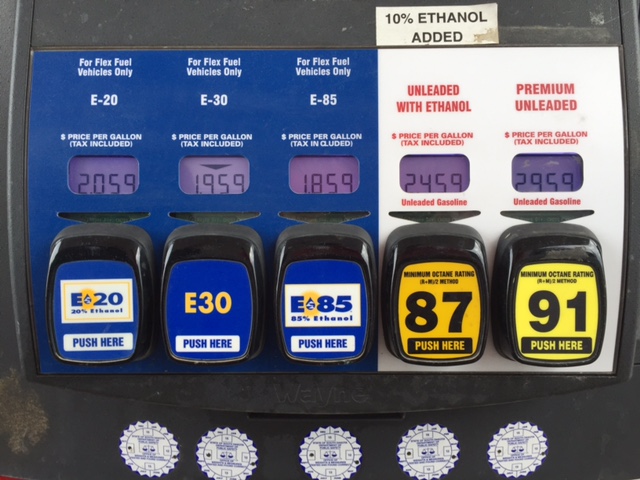E30 Demonstration Shows Fuel's Promise
E30 Has No Observable Negative Effects on Overall Vehicle Performance
OMAHA (DTN) -- The use of E30 in state of Nebraska non flexible-fuel vehicles for one year found no observable negative effects on vehicle performance or costs per mile, the results of a study released by the state on Monday show.
Just as markets for E15 continue to grow across the country, the study also found because E30 is about 2.5% less expensive than E15, the wide use of E30 would make it a more economically viable fuel.
The Trump administration approved the year-round sale of E15 in 2019. https://www.dtnpf.com/…
What's more, the study found non-FFVs were able to adjust the air-to-fuel ratio to adapt to E30's higher oxygen content.
The results of the study were released during a Monday press conference by Nebraska Gov. Pete Ricketts.
"So, this is really a kind of a step to getting certification for higher blends of ethanol in your regular vehicle," Ricketts said.
"When you use E30 in your vehicles, this tremendously helps out the environment. So, for example, by using E30 you can reduce carbon black emissions from your tailpipe by 45% and reduce the NOX (nitrous oxide) and the hydrocarbon emissions by over 20%. People, by using ethanol, can save money at the pump, help clean up the environment and of course it's great for our farmers and ranchers as 35% of our corn crop goes into ethanol."
P[L1] D[0x0] M[300x250] OOP[F] ADUNIT[] T[]
The year-long demonstration involved 50 non-FFVs from the state of Nebraska to determine adaptability, economic feasibility and environmental effect of using E30. Twenty-six vehicles were fueled by E15 and 24 vehicles were fueled by E30.
The vehicles used were Dodge Avengers and Chargers, as well as Ford Fusion, model years ranging from 2013 to 2015.
"The increase in ethanol concentration does not cause engine coolant temperature to change significantly," a University of Nebraska-Lincoln analysis of the study results said.
"Finally, a multitude of more complex statistical data analyses were conducted to determine the effect of E30 on overall vehicle performance. Results from that analysis indicates no significant change in performance between the two fuel types."
The analysis said if the state's non-FFV vehicle fleet changes from using E15 to E30, ethanol consumption would increase by 66,000 gallons per year with a reduction of 529 tons of carbon dioxide emissions.
If E30 consumption was allowed statewide and 10% of drivers convert from E10 to E30, ethanol consumption would grow by 18.5 million gallons per year and CO2 emissions would decrease by 64,000 tons per year.
Roger Berry, administrator of the Nebraska Ethanol Board, said the study confirms E30 could be safely used in the state.
"They have to know that the legacy fleet on the road today can use that same fuel," he said.
"That is exactly why we have demonstrated with this project that today's cars will not be found along the side of the road as junk, because they put E30 into their car. We have not had a single incident of a car being left along the side of the road because they use E30, it works perfectly."
Geoff Cooper, president and chief executive officer of the Renewable Fuels Association, said evidence continues to mount that E30 can be used safely in regular vehicles.
"It is especially notable that while E30 may have a lower energy content per gallon, the report shows no meaningful loss of fuel economy under real-world driving conditions," Cooper said in a statement.
"Indeed, if these vehicles had been optimized to take advantage of E30's higher octane rating -- something RFA continues to advocate for -- they would have likely seen even better fuel economy results. The key takeaway is that more than 300,000 miles were driven on E30 in vehicles that are between six and eight years old, with no reported or observable impacts on vehicle performance. And it's likely that newer vehicles are even more adaptable to higher ethanol blends."
Read the E30 demonstration results here: https://ethanol.nebraska.gov/…
Todd Neeley can be reached at todd.neeley@dtn.com
Follow him on Twitter @toddneeleyDTN
(c) Copyright 2021 DTN, LLC. All rights reserved.




